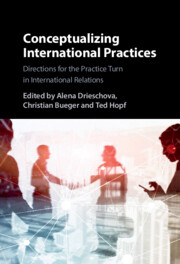Book contents
- Conceptualizing International Practices
- Conceptualizing International Practices
- Copyright page
- Contents
- Figures
- Table
- Contributors
- Acknowledgements
- Part I Introduction: Conversations and the Evolution of Practice Theorizing
- Part II Key Concepts of IR Scholarship
- 3 Epistemic Communities of Practice
- 4 Practices and Norms
- 5 The Normativity of International Practices
- 6 Resistance as Practice
- 7 For a Practice Approach to Authority
- 8 Evolution in International Practices
- Part III Innovative Concepts
- Part IV Conclusion: The Future of Practice Theorizing
- References
- Index
6 - Resistance as Practice
Counter-Conduct after Foucault
from Part II - Key Concepts of IR Scholarship
Published online by Cambridge University Press: 09 June 2022
- Conceptualizing International Practices
- Conceptualizing International Practices
- Copyright page
- Contents
- Figures
- Table
- Contributors
- Acknowledgements
- Part I Introduction: Conversations and the Evolution of Practice Theorizing
- Part II Key Concepts of IR Scholarship
- 3 Epistemic Communities of Practice
- 4 Practices and Norms
- 5 The Normativity of International Practices
- 6 Resistance as Practice
- 7 For a Practice Approach to Authority
- 8 Evolution in International Practices
- Part III Innovative Concepts
- Part IV Conclusion: The Future of Practice Theorizing
- References
- Index
Summary
This chapter heeds recent calls for a theoretical broadening in practice-oriented approaches to world politics by bringing Foucault into a conversation with practice-oriented approaches to power. In particular, it explores Foucault’s contribution to the study of resistance as practice. Foucault has typically been read in IR as a theorist of social order, less often as a theorist of resistance. Yet in his writing on ‘counter-conduct’ it is precisely forms of resistance that Foucault engages. The chapter argues that counter-conduct can be a useful tool for a practice-based account of resistance but that it also needs to be modified when used in the present. This is because Foucault developed the idea of counter-conduct by studying dissidence and refusal among religious movements in Europe in the Middle Ages, a time very different from our own. Largely missing from Foucault’s account is a sense of how counter-conducts are mediated; that is, how they attract (or fail to attract) a public. To address this gap the chapter proposes a notion of the scene. It demonstrates the value of a concern with scenes by means of a case: practices of migrant solidarity in Europe, the criminalization of those practices, and resistance to such criminalization.
- Type
- Chapter
- Information
- Conceptualizing International PracticesDirections for the Practice Turn in International Relations, pp. 122 - 147Publisher: Cambridge University PressPrint publication year: 2022
- 2
- Cited by

